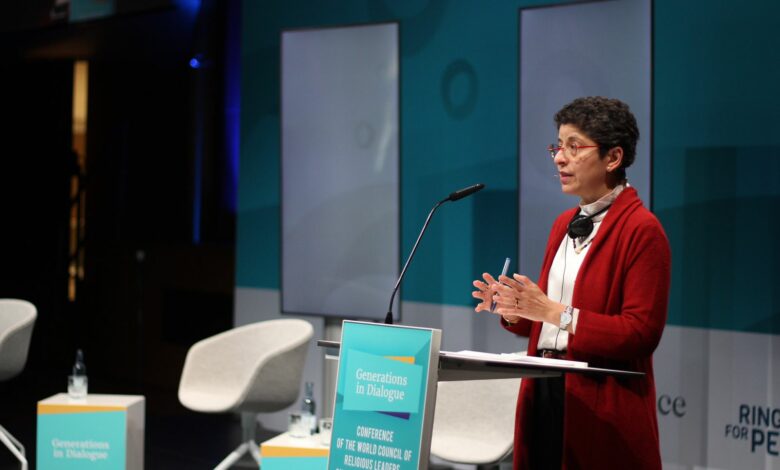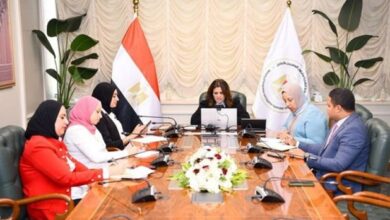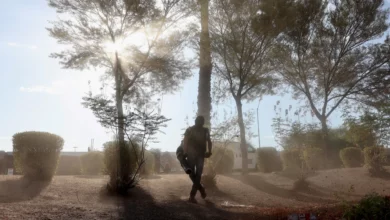
The World Conference of Religious Leaders comes to an end today, with “Dialogue between Generations”, the cooperation between generations of religious communities in diplomacy as its defining theme.
Around 1,700 participants from 86 countries took part in the dialogue of religions and generations – virtually or on site in Lindau on Lake Constance.
Younger generations for the first time played a prominent part in the program of the religious conference.
The “Conference of the World Council of Religious Leaders on Faith and Diplomacy: Generations in Dialogue” involved young people in discussions on global peace processes, on equal footing with experienced religious leaders and diplomats.
Twenty-two percent of the participants were under 35 years of age – women accounted for 45 percent of all participants this year.
“This conference vindicates Religions for Peace’s mission and mandate to further multi-religiously competent diplomacy. This is the tipping point for building peaceful, just and inclusive societies. As was noted: not only should we not ignore religions, but there will be no success in diplomacy without them,” said Egypt’s Secretary General of Religions for Peace International Azza Karam.
One of these younger participants, the Chairperson of the Interfaith Youth Network of the Democratic Republic of the Congo Christian K. Lupemba commented: “This conference opened a space where the voices of youth were heard by the right people. Now, beyond words we would like to see deeds. Because through their performances in different positions during this conference, young people have shown that they are acting today to take over tomorrow.
“With love, respect and consideration, we say to our elders: ‘We are ready, give us some space at the table, we will be able to support you by working alongside you to contribute to the emergence of a a new global civilization, more peaceful, more equitable and in which every individual finds themselves in the right place.’ ”
At the end of the conference, the World Council, as the main decision-making body of Religions for Peace – consisting of 61 religious leaders from around the world and from all faiths – released its statement speaking on global respect for human rights and global justice in the distribution of vaccines.
No one, it says, should be discriminated against on the basis of race, color, gender, ethnicity, nationality or religion.
They also address the protection of the climate, stating that the World Council invites all political leaders and diplomats to work with them on the transformation tasks ahead and to involve different generations in this matter.
“In these unique times, this conference provided the opportunity to work together to address this unprecedented pandemic, the issue of youth engagement, and the role of religious leaders in diplomacy. It was very inspiring to see the great work the faith community is doing around the world in promoting peace and development. We are grateful to our hosts Rings for Peace and the Government of Germany for their great hospitality.
“This conference is meant to reaffirm our commitment to creating resilient communities and to learn best practices of doing so,” says Imam Mohamed Magid, Co-President Religions for Peace, Lead Imam of the All Dulles Area Muslim Society (ADAMS) Center Virginia and Chair of the Islamic Society of North America (ISNA).”
In discussion rounds where debates and talks were jointly moderated by religious leaders and diplomats, topics involved around peace, security, environmental protection and humanitarian work.
The four-day program promoted dialogue and attracted lively interest – both in the hall in the Inselhalle, the conference center, and on the specially set-up digital conference platform.
An average of 1,500 participants followed the discussions on the internet, got involved in discussions and made it a rousing success.
Almost 50 hours of the program were streamed live.
“The conference encouraged intergenerational dialogue by allowing for inclusivity of youth participation on many engaging levels. It opened opportunities for partnerships, supportive friendships and networking, providing a space of learning for transformation by sharing our interfaith work with each other to build a multi-faith solidarity. It encouraged people of faith to come together in love and unity for peace building and problem solving to global humanitarian issues,” said South African Youth Member Religions for Peace Merylene Chitharai, at the closing press conference.
The “Conference of the World Council of Religious Leaders on Faith and Diplomacy: Generations in Dialogue” is organized by the Peace Dialogue and Civil Society Foundation (based in Lindau).
The Lindau Foundation is working closely with the non-governmental organization Religions for Peace (based in New York), which is developing the program for the world conference. Religions for Peace is accredited by the United Nations.
The most important decision-making body of the organization, the World Council of Religious Leaders, will meet at the start of the conference.
The World Council consists of 61 principal members representing millions of believers around the world. Germany’s Federal Foreign Office is providing substantial funding for the conference.




